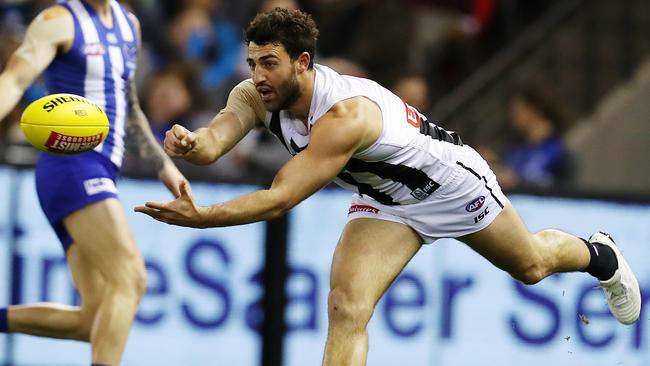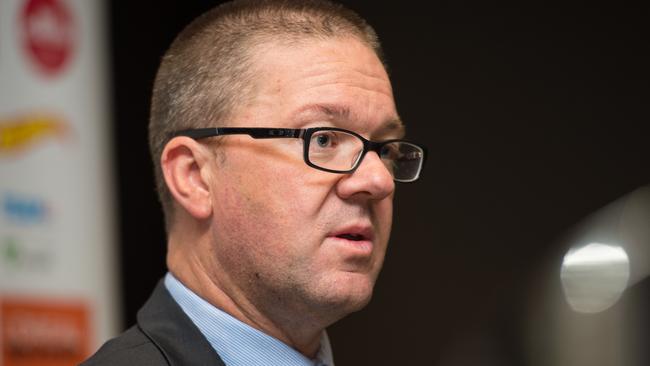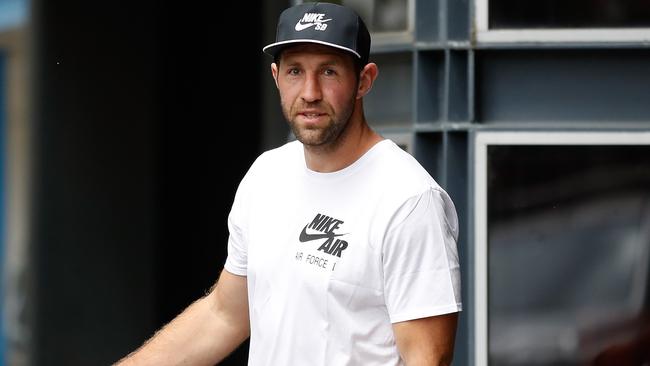Current and former AFL players seeking more mental health help
MORE current and former AFL players accessed sessions with mental health professionals last year than in 2016 in a sign depression and mental health is becoming destigmatised in the AFL and players no longer have to suffer in silence.

AFL News
Don't miss out on the headlines from AFL News. Followed categories will be added to My News.
CURRENT and former AFL players accessed sessions with mental health professionals last year, at more than twice the rate of the previous year.
The players attended 1322 sessions with AFLPA-appointed mental health experts — a watershed moment in the treatment of depression and other problems.
AFLPA chief executive Paul Marsh said it was a sign depression and mental health issues were being destigmatised in the AFL after years of players suffering in silence.
TRAVIS CLOKE: RETIRED STAR REVEALS MENTAL HEALTH BATTLE
COLLINGWOOD: ALEX FASOLO STEPS AWAY TO DEAL WITH DEPRESSION
YOUNG BOMBER: AARON FRANCIS DEALING WITH MENTAL HEALTH ISSUE
“It’s great that we’ve got to a position where players are becoming more comfortable in speaking up and accessing these services available to them, whether that be through the club or the AFLPA.”
The 1322 wellbeing sessions delivered to players were up from 550 the previous year, included 472 for current players, 680 for former players, and 170 to AFLW players.
The Herald Sun can reveal seven clubs have already taken part in a new daylong AFLPA course designed to help them understand and manage mental health issues.

The Brain-Based Mental Health Education course sees a small group from the AFLPA’s psychology services team spending the day with a club’s senior coaches, administrators and leadership group.
AFL players Travis Cloke, Tom Boyd, Alex Fasolo and Aaron Francis took time away from the game because of mental health issues in the past year.
MARK ROBINSON: TASMANIA IS GIL’S PROBLEM TO FIX
FEEDBACK: WHAT DID CLUBS THINK OF AFLX?
CASH GRAB: ‘$1M IS THE NEW BENCHMARK’
GWS ruckman Tom Downie retired because of mental health issues, while Hawthorn’s Josh Gibson revealed a long battle with severe anxiety.
AFLPA psychology services co-ordinator Dave Williams said the number of AFL players with mental health issues was similar to their age demographic in society.
But he said the huge upsurge in requests for treatment showed players were no longer afraid to confront issues or improve their mental health.

Players can be referred to the AFLPA’s team of 83 psychologists by clubs, player managers or player development managers.
“The main drivers of mental heath issues are many and varied, but like all citizens, players experience stress,’’ he said.
“Guys are more willing to talk about their stresses and struggles and rather than being willing to suffering silence, they can get assistance with that.
“It’s about on par with the general population — we see a one-in-five incidence rate of people experiencing mental health challenges.
“The difference here is there is higher access to resources in many ways in terms of being able to get professional assistance.”
There were 48 wellbeing workshops conducted at clubs, with a social media awareness program integrated into the education seminar for first-year players for the first time.

A total of $3.1 million was spent on current player development and wellbeing programs, with 113 past players helped by the AFLPA national psychology network.
The AFLPA also distributed $466,000 in hardship grants to 29 alumni and distributed 13 ex-players with $124,000 for long-term hardship through its discretionary trust fund.
The new mental health education program in clubs is industry specific and allows officials to recognise the signs of players and officials battling mental health issues.
“Just as you do with physical first aid, we are developing this from an emotional point of view,” Williams said.
“It helps people know how to connect with others who need to have that conversation.
“We took it upon ourselves to develop a program unique to sport which is practical and education-based.
“We see it as a real vote of confidence that clubs value it highly enough to give up their time and make it a priority.”
Originally published as Current and former AFL players seeking more mental health help
